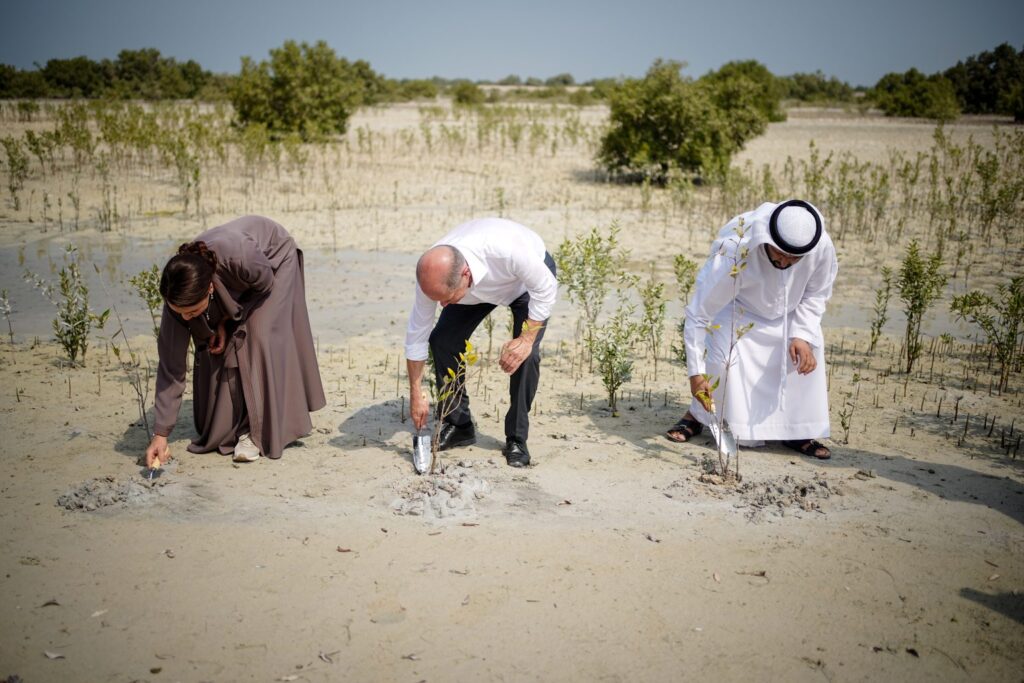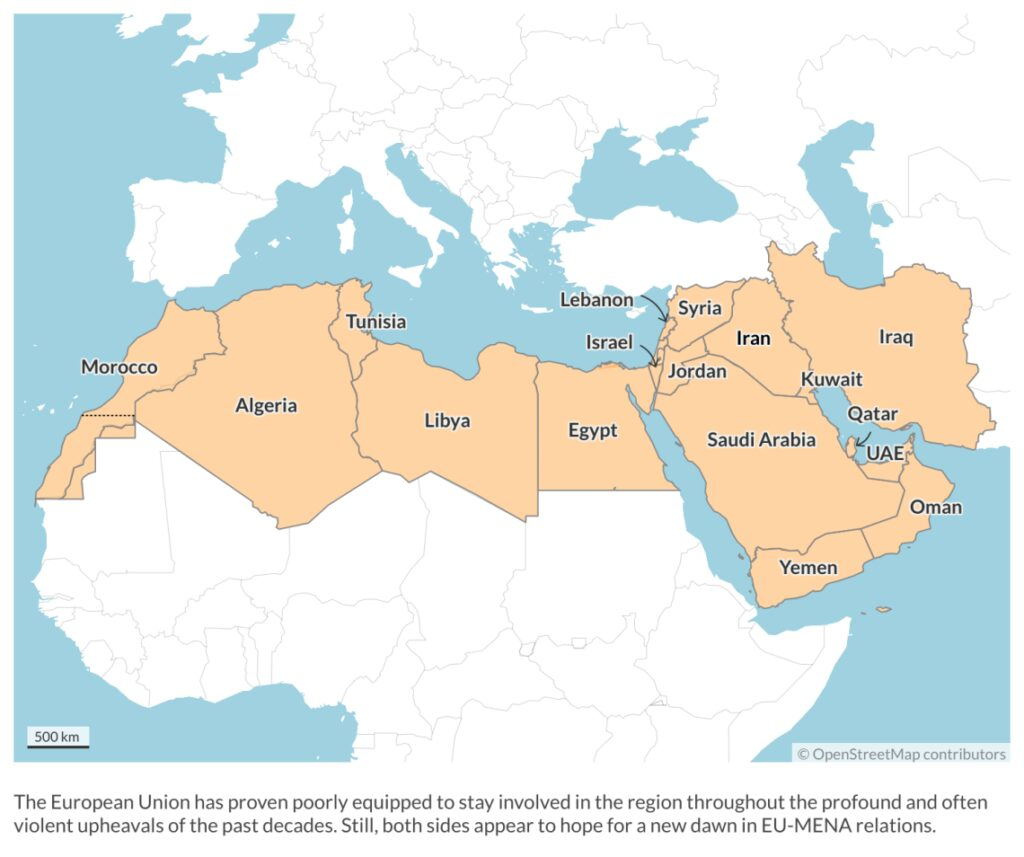
Now that Europe is desperate to find new energy suppliers, the resource-rich countries of the Middle East and North Africa are hoping to boost their economy and influence.
- Europe is unlikely to turn back to Russia for energy even after the war
- MENA countries have suddenly become much more valuable allies
- World powers’ competition for influence in the region will intensify
Since Russia’s invasion of Ukraine in February 2022, Europe has welcomed almost 8 million Ukrainian refugees and spent 523 million euros on humanitarian aid and civil protection support. It has also spent a total of 9 billion euros on financial assistance toward stability and another 3.1 billion to support the armed forces of Ukraine. To this tally must be added the substantial collateral costs incurred by European businesses because of sanctions against Russia.
In short, Europe has had to invest the bulk of its economic and political bandwidth into the largest armed conflict on the continent since World War II. Still, the EU has not lost sight of the Middle East and North Africa (MENA).
The resource-rich MENA countries as allies
The loss of Russia as an energy supplier has given rise to new strategic interests that will profoundly influence the global geopolitical landscape in the decade ahead. It now appears likely that Moscow will go from supplying 45 percent of Europe’s gas to none soon. But the Kremlin will not stand idly by. The entire MENA area, with its extraordinary oil and gas resources, will become part of the strategic competition that pits the West against Russia, China and other ancillary powers such as Iran.
The latest version of the National Security Strategy of the United States, the EU Compass of 2022, and the February 2022 “new era” declaration signed by China and Russia all make these new geopolitical tensions overwhelmingly clear. In essence, the February 2022 declaration amounted to a Russian and Chinese manifesto for an alternative world order based on their values. Essentially, each document presents a worldview in which the use of force is justified to assert one’s values. EU Foreign Affairs Minister Josep Borrell even declared that Europe “must learn to speak the language of power.”
It is no coincidence that in recent months the leaders of France, Germany, and Italy made several trips to Africa.A Europe with the will to establish a common military defense by 2030 would have been unthinkable a year ago, but the war in Ukraine changed everything. It shed light on the deep ideological divide between Russia and the entire West, but also on Europe’s urgent need to wean itself off Russian oil and gas.
The MENA region is closely following the war in Ukraine. From Baghdad to Algiers, from Ankara to Doha, governments wonder how the situation will evolve. Despite the impact on grain supplies, some countries in the area see the conflict as an extraordinary opportunity to improve their international standing.
Algeria, for example, knows that it could offer a viable alternative for gas supplies with the right investments. Libya could do the same for oil, if only it had a government worthy of the name. It is no coincidence that in recent months the leaders of France, Germany, and Italy made several trips to Africa. Their ultimate objective is to secure new energy supplies.
Facts & figures
The Middle East and North Africa

In the Middle East, Qatar could supply gas, and Saudi Arabia and Iraq oil, although the latter would have to rehaul its infrastructure. The United Arab Emirates has increased its planned energy investment spending for the next five years by almost 20 percent, $150 billion to increase short-term production to meet the demands caused by the war in Ukraine. The target is to achieve five million oil barrels per day by 2027. The country is also proceeding rapidly with plans to strengthen its position as a liquified natural gas exporter.
In this picture, however, there is one player that needs to be watched closely. China is rapidly becoming an independent actor in the Gulf region. It should come as no surprise if Beijing seeks to reduce EU and U.S. influence in the Middle East by forging deep, energy-driven economic ties with Saudi Arabia, the UAE and Qatar.
The countries of Africa and the Middle East hoping for a new ‘energy spring’ must not forget that Europe is on the path to decarbonization.In many ways, the future will be determined by what plays out in Africa. The U.S. seems to be following this strategic approach, as evidenced by the U.S.-Africa Leader Summit of December 2022, last held in 2014. The summit saw several partnerships announced in key areas like climate change, infrastructure and governance. This type of forum is already part of many other countries’ strategies, including China, Turkey and France.
As for Russia, Moscow moves in a very different way: operating directly on the ground with paramilitary groups supporting amenable local governments, often committing human rights violations. It is telling that 26 African nations out of 54 have declined, in one way or another to support the UN General Assembly Resolution condemning Russian aggression against Ukraine. This is a clear sign that the West, and especially Europe, must not take Africa for granted, regardless of economic interests.
Scenarios
There is still much uncertainty over the geopolitical developments to come in months ahead. Much depends on the ongoing conflict in Ukraine. However, it is unlikely that Europe will focus on the pressing social problems of the Maghreb and the Middle East. On the contrary, they will ignore them. European capitals, now in desperate need of energy, will be more inclined to turn a blind eye rather than point out human rights violations in MENA countries.
The year 2022 revealed Europe’s great energy vulnerability. This turning point will mark the start of a new era of increasing Western commitment to cooperate with MENA states. The region’s strategic importance has increased so dramatically since February 2022 that it will undoubtedly remain even if the conflict should end in the coming months.
One final point, however, deserves to be stressed: the countries of Africa and the Middle East hoping for a new “energy spring” must not forget that Europe is on the path to decarbonization, as reaffirmed by the REPowerEU plan of May 2022. If they want to keep their economies afloat, Algeria, Libya and Tunisia will have to follow Morocco’s example and turn to renewable energy as soon as possible. But this will be a long process, especially in Libya.
